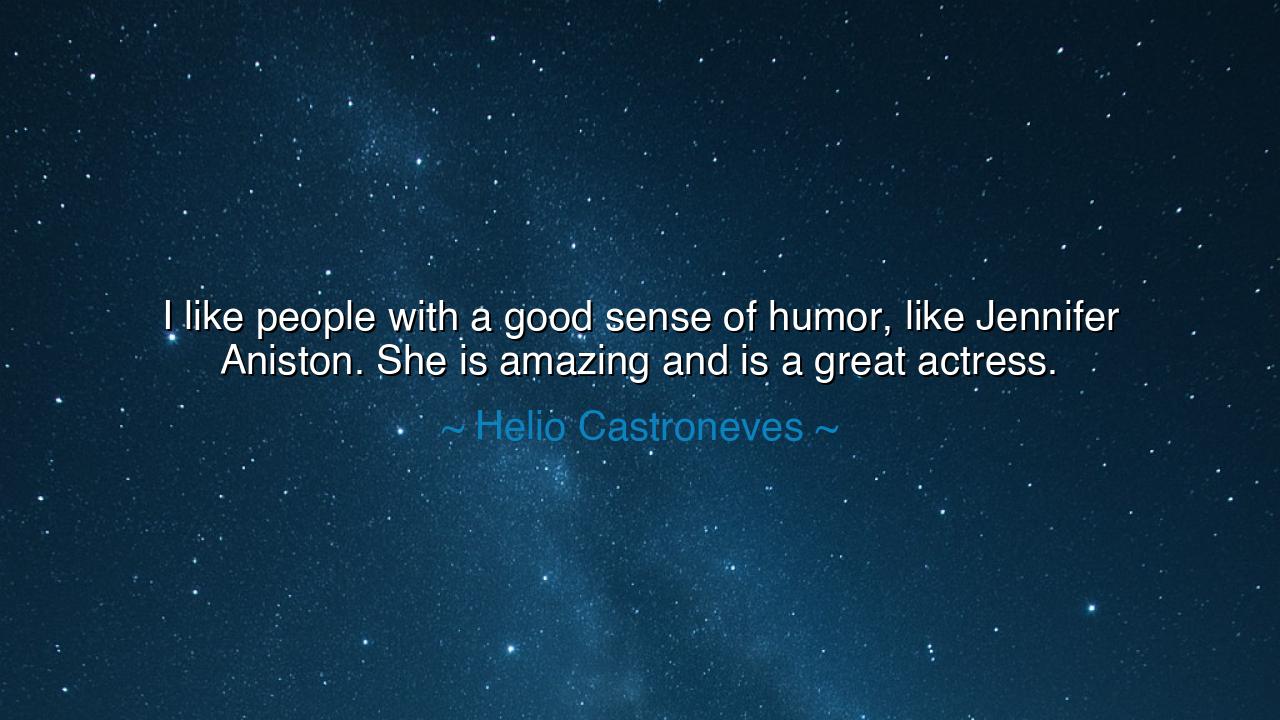
I like people with a good sense of humor, like Jennifer Aniston.
I like people with a good sense of humor, like Jennifer Aniston. She is amazing and is a great actress.






In the grand story of human existence, there is a force more powerful than strength or intellect alone—a force that transcends the boundaries of language, culture, and time. Humor. It is the gift that connects us all, the light that shines in the darkest of moments, and the spark that ignites the spirit. When Helio Castroneves speaks of people with a good sense of humor, he is acknowledging something far greater than simple amusement. He speaks of a virtue—one that can both heal and uplift, inspire and bond. He points to Jennifer Aniston, whom he praises as “amazing” and a “great actress,” not merely for her ability to entertain, but for the joy and warmth she brings to the world through her humor. In this simple declaration, he unveils a profound truth: humor, in its truest form, is an essential quality that elevates the human experience.
In the ancient wisdom, humor was seen as an expression of the soul’s grace and insight. It was not just the ability to laugh, but the ability to see the world through the lens of lightness and clarity, recognizing the absurdities of life without losing one’s dignity. The great philosopher Socrates used humor to disarm, to open minds, and to lead others toward profound truth. He did not ridicule to demean, but rather laughed at the contradictions of life to expose them. In this way, he taught that humor was not merely for enjoyment, but for deeper understanding. Jennifer Aniston embodies this same spirit in her craft, using her humor not to mock, but to reflect the complexities and joys of life, allowing others to see the beauty in the ordinary.
Let us look, then, to the actress herself—Jennifer Aniston, a modern-day muse whose ability to bring humor into her roles has made her beloved by millions. But what is it that makes her humor so captivating? It is not simply the cleverness of her lines or the perfect timing of her expressions, but the authenticity she brings to each performance. She does not attempt to entertain by force; instead, she invites us to laugh through the subtle, the authentic, and the real. Much like the ancient actors who graced the stages of Greece, Aniston’s humor speaks to the human condition in all its contradictions, flaws, and triumphs. In her roles, especially as Rachel Green in Friends, she brought forth a humor that was neither loud nor excessive, but quiet and insightful—a humor that captured the complexities of love, friendship, and identity.
In the same way, the ancient Greeks celebrated humor as a reflection of wisdom. Take, for example, the playwright Aristophanes, whose comedies were both sharp and revealing. His humor did not rely on grossness or the crassness that so often permeates today’s entertainments; rather, he used humor to hold a mirror up to society. Through laughter, he challenged the norms of the time, forced people to confront their flaws, and made them reconsider their priorities. Aniston’s humor, though more understated, follows a similar path. Through her performances, she invites us to laugh at the complexities of life, at ourselves, and at the contradictions inherent in our relationships and our roles in society. Humor, in both her craft and the ancient traditions, is a way to reveal truth without harshness, to bring about understanding through joy rather than through conflict.
Helio Castroneves’ admiration for Aniston is not rooted merely in her ability to entertain, but in her embodiment of a quality that has always been revered: the ability to see the world through humor, to rise above its challenges and absurdities. Castroneves, a master of precision and focus in the world of racing, understands that humor is a force that brings people together, that lightens the burdens of the soul and enhances the beauty of the human experience. He is no stranger to the intensity of life’s trials, but he recognizes that humor—like that of Aniston—is a gift, one that provides both relief and wisdom. In this, we are reminded that humor is not a frivolous quality, but a strength that can uplift and empower.
The lesson we take from Castroneves, Aniston, and the ancient wisdom is simple yet profound: humor is not just a source of amusement, but a virtue—a tool for connection, understanding, and growth. We must seek to cultivate a sense of humor in our own lives, one that does not mock or diminish, but elevates. We are called to approach life with lightness and grace, recognizing the absurdities of the world, yet not losing our dignity in the process. Just as Jennifer Aniston has done in her career, we must learn to laugh not only at the world but at ourselves, embracing the complexities of life with open hearts and a shared sense of joy.
Thus, we are reminded that humor is a powerful force, one that transcends the ordinary and touches the soul. Let us live as Aniston does—authentically, with a sharp wit and a deep understanding of the human condition. Let us embrace the gift of humor in our own lives, sharing it with others, not to mock, but to uplift. Humor can be a bridge between souls, a light in the darkness, and a means by which we reveal the truths of our existence. May we carry this lesson forward: that through humor, we find both wisdom and connection, and in the joy it brings, we find the essence of what it means to truly live.






AAdministratorAdministrator
Welcome, honored guests. Please leave a comment, we will respond soon